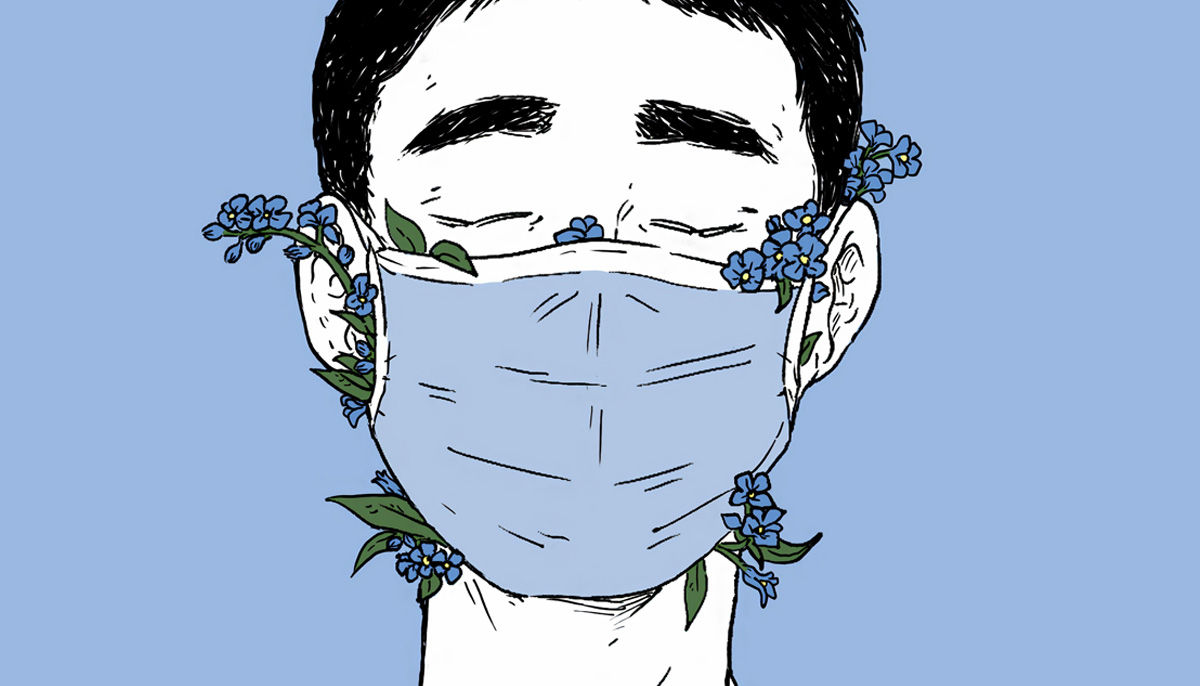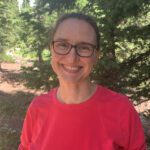When we exited the Zoom call after a Sunday morning gathering with our local sangha, I felt closer to them than ever. The call had been unconventional — in a global-pandemic kind of way. One woman’s cat kept climbing in front of her camera, another had iffy Wi-Fi from her camper in the state she happened to be in when it was time to shelter in place. The man who gave the dharma talk was unshaven, and had “quarantine hair” he’d decided to let have a life of its own. There was a rumpled intimacy, all of us smiling at each other from our so-very-lived-in spaces, freshly realizing how much we miss seeing these precious people.
My breath hadn’t felt like a safe place for a while.
The dharma talk that day was spoken from a place of honesty, vulnerability, and curiosity, about practicing during the pandemic. I was distracted by that morning’s concoction of Covid-19 symptoms in my body: light-headedness, fatigue, and mild oxygen hunger. I also felt emotion stirring. During my 20-some years of meditation and mindfulness practice, my breath has become an intimate friend — a home base that always warmly welcomed me back to my body and the present moment. Meditating with the sangha that morning, I realized my breath hadn’t felt like a safe place for a while. I realized that in trying to find a Middle Way through Covid-19, I’d gotten lost in a nowhere land that felt not like the equanimity I sought, but like a failure to thrive.
The first couple of times I thought I was recovering from Covid-19, I was antsy to get back to my job as a hospital chaplain. I kept picturing the faces of the nurses and doctors in the ICU and ER and wanted to be there to support them. In those early days, I imagined going back with immunity, able to be with Covid patients when their families could not. As the symptoms kept resurging, the disappointment became painful. It felt like losing at a game of Chutes and Ladders.
I was hoping to recover, but I wasn’t recovering. I’ve never been big on hope, in general — I’ve practiced bearing witness to what is present rather than hoping for reality to be different than it is. But when I’d wake up feeling a little better, I couldn’t help hoping I was actually getting better. A few times my teary frustration turned to anger so powerful I thought it might drive the virus from my body. Nope.
I have no underlying health conditions, but I’ve been sick plenty of times. I’ve had H1N1. But this — this Covid-19 doesn’t play by the rules. Sitting making a grocery list, my oxygen level would drop suddenly. For months my brain has struggled with short-term memory and forming sentences. The fatigue has been gnarly. Though it no longer feels like I’m wearing a lead apron on my chest, it still hurts to breathe most days. I know my body well, but along the way, I began to distrust it.
When my lifeline of oxygen got squeezed, a singular sense of self burst forward, eyes wide.
I also began to realize my body’s impermanence — my mortality — might not be a distant concern. I really don’t know how this story is going to go for me. As a hospital chaplain, I’ve been present for many deaths, both traumatic and peaceful. I’ve supported many people through respiratory distress. During one of my last shifts before I got sick I was called to the ICU to support a woman in her 40s who was short of breath and panicking. I was calm and loving. I held her hand (pre-pandemic protocol) until she fell asleep. But since then, the moments of terror when my own oxygen has dropped drastically have given me a visceral new empathy for people who are struggling to breathe. The truth of no-self has seeped into my bones over years of meditation and reflection, but when my lifeline of oxygen got squeezed, a singular sense of self burst forward, eyes wide. I wanted to live. I want to live.
After announcing several times that I was definitely getting better, only to be brought to my knees again, the ups and downs of this “long-haul” version of Covid-19 became so painful I had to stop hoping for recovery. I knew it wouldn’t help if my thoughts became hopeless, though. I aimed for a Middle Way of acceptance, without clinging to signs of improvement or resisting the symptoms. The symptoms were evidence of my body fighting valiantly against a bewildering new foe, after all!
Acceptance eased the mental suffering for a while, but night after night of low-grade fever, I slid from acceptance into listlessness. Hopelessness. Failure to thrive. I remembered my teacher, Roshi Joan Halifax, talking about “wise hope,” and I went back to her words. She talks about an “unconditional hope” that embraces both the suffering and the potential for life to surprise me. That’s what is alive in my practice right now. It has me drinking more water, and using the energy I do have to write. Reaching out to the wider sangha as we navigate this pandemic separately but alongside each other.
As a person who has voluntarily practiced not-knowing for years, I’m being humbled by this virus on multiple levels. My body is a microcosm of the unknown that the population of Earth is involuntarily facing. When will this virus retreat? What irreparable damage is it causing? Will I accept the invitation from this pandemic to, as the poet Rumi says in “The Guest House,” allow this crowd of sorrows to sweep my house empty of its furniture, clearing out what no longer serves and making space for something freshly true and of the essence? Will our species accept this invitation to transformation? Is this the chapter in future history books where civilization pivots from the Age of Me to the Age of We? I hope so.

